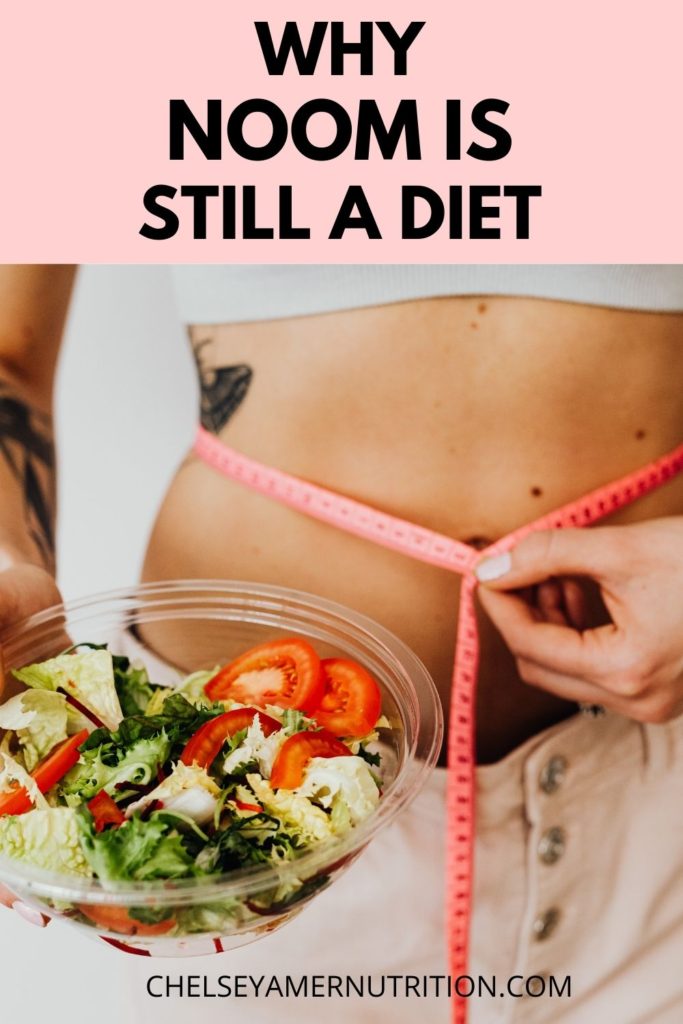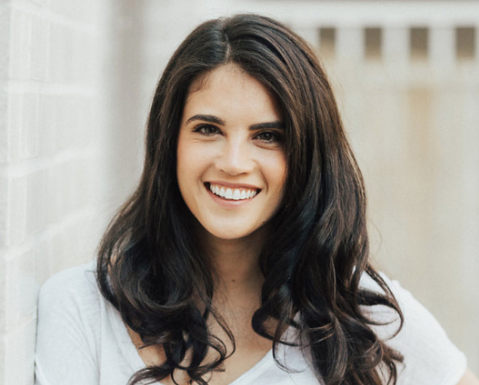Why Noom Is Still a Diet
Noom is still a diet. Today I’m breaking down my review of the popular diet and how it may be tricking you.

I’m forgetting exactly how it came up, but a few weeks ago I was sitting in my parents’ kitchen (very pregnant and exhausted) when my dad asked me about Noom. He said, “It sounds just like what you do…”
And that’s when the 4-alarm fire started ringing in my head. “NO NO NO NO NO!!!! We are NOT promoting the same things!!!”
Of course that’s when my mom chimed in about the success her coworkers have seen on the diet. “Nancy has lost 20 pounds and feels great!”
And I’m so happy for Nancy if that’s her goal, and I don’t blame her for relying on Noom to reach her goal… HOWEVER, Noom and I do not promote the same thing.
Noom is still a diet with some REALLY good marketing.
When you Google Noom one of the first things you’ll see is “Noom: Stop dieting. Get life-long results.”
If you’re thinking “HEY, THAT’S WHAT I WANT…” you’re not alone. Again, they have REALLY good, deceitful marketing going on.
What is Noom and why is Noom still a diet?
According to sources, “Noom is a subscription-based app for tracking a person’s food intake and exercise habits. The company is known for its emphasis on behavior change and mental wellness.”
But ask anyone who’s signed up for Noom and they’ll tell you, despite what your initial weight, sex, diet history, and goals are:
- You’ll be counting calories (and likely assigned a 1200 calorie diet)
- It’s highly suggested you weigh-in daily (despite any history of disordered eating)
- Logging all of your food is required
- Foods are labeled as red, yellow, or green AKA “good” versus “bad”
My Experience with Noom
So to give you a full picture of why Noom is still a diet, I signed up for the trial. Right now you can sign up for as little as $0.50 for the 7-day trial because they don’t want anyone to not have access to this wonderful program due to financial hardship. (Save your $0.50!) Of course, I did not actually follow the program, but I wanted first-hand experience to share and an inside peek at the educational and psychological content. I didn’t just want to rely on what other people told me.
First, you go through an in-depth intake process. They ask a lot of questions about your height, sex, gender, weight loss goals, exercise, lifestyle, and reasoning behind your weight loss goals (like for an event short-term or long-term health – this obviously irked me!).
Sprinkled into their intake process is a graph that shows you how long it will take to reach your goals. Somehow, my arbitrary made up 10 pound goal kept becoming more attainable at a closer date – I still have no clue why they kept thinking I’d lose weight faster. It’s not like I said I was a gym rat!
So I went through their entire intake process and let me tell you… they say all the right things…
- They’ll tell you there are no good or bad foods, but then categorize foods as “Just green, yellow and red based on caloric density”
- You can ”still eat your favorite foods,” but “if you mess up, that’s ok!”
Perhaps the part of the sign up process that bothers me the most, however, is that they sight a lot of studies. But for most of them the time period examined was only 6 months. Anyone can do anything for 6 months. But if a diet really worked, it would sustain results for YEARS. I haven’t seen one study that proves that.
Upon signing up, you’re prompted to download their app where you can connect to the education on the platform and your coach. While some of the behavioral and “psychology” that they use can be helpful to form healthful habits (I’m all for that!), the rules and rigidity hiding behind “not a diet” give individuals false hope.
Just look up what some people say on Twitter about Noom and you’ll see.
One user tweeted… “Have to have a snack tonight because my calories are too low.”
People are starving! They need an evening snack because they’re restricted all day. This perpetuates or starts a binge-restrict cycle and can even instigate some disordered habits.
Another said… “I’ve been so good this week, but planning an epic cheat day in the next month or so…”
If Noom was not a diet, then why do people need a cheat day? That implies that they require a full day of eating “off limits” foods. As we know, putting foods as off-limits intensifies cravings and feelings of being out of control around foods.
In fact, I also asked my Instagram community who tried Noom (like genuinely tried to use it as a dieting tool) to which I received these responses…
“I was not a fan. I lost about 10 pounds, and gained it all back. Didn’t teach me healthy habits.”
“Did not like it and lasted a few days.”
“Not very good at answering my questions. I almost asked if the person was real or a computer.”
Why I Dislike Noom as a Registered Dietitian
My nutrition philosophy is simple: eat all foods that help you feel your best.
Feeling your best, to me, includes physically and emotionally. So sometimes that means cookies with all the butter and sugar and sometimes that means grilled fish and veggies with roasted sweet potatoes because that will help you feel your best. It’s balancing pizza night with a salad.
But I do not think that pizza deserves a “bad” label and that you should feel bad for eating it. Food is food and should be enjoyed, no matter what it is. There are no “bad” foods.
But to equate 1 burger to 14 salads is a bit much. Why make someone feel guilty for enjoying a burger? You’re better off fully enjoying your burger and then eating a salad when you want one. Studies find over time your diet evens out and you will in fact consume a healthy diet if you give yourself permission to eat all foods.
If you want to diet, fine, but stop pretending that you’re not a diet. It’s just not fair to people who are genuinely confused.
Noom is clearly claiming not to be a restrictive diet. But if you’re limiting calories and making lists of “approved” vs. “not approved” foods… you’re a diet!
The diet industry is a $72 BILLION dollar industry. Of course Noom has the financial backing and money to create ads that monopolize on the non-diet movement. But it’s deceitful to their customers.
I guess this is a good point in this article to say if Noom worked for you and you had success, GREAT! I’m genuinely happy for you. But as a professional I feel it is my responsibility to point out these discrepancies about what really works.
If you’re considering Noom…
Noom will undoubtedly “work” for some people… while you follow the plan and continue to limit your food choices.
But is this really “working” for long-term health promotion? I’m not too sure.
In my professional opinion, as scientific research demonstrates, you’d be better off maintaining a slightly higher weight without the yo-yo effect that will undoubtedly come when you stop following the Noom plan.
If you’re looking to get healthier, here are some things I suggest you do instead of signing up for Noom…
- Get curious about how food makes you FEEL. What helps you feel energized throughout the day?
- Learn nutrition fundamentals instead of following “approved” lists of “green” foods.
- Get in touch with your hunger cues
- Focus on goals outside of your weight. Studies show putting so much emphasis on your weight doesn’t work (and can drive you crazy!)
- Notice your fullness. Honor it. Over time, learn to stop eating when you’re full most of the time.
- Understand why you’re eating when you’re not hungry. What emotions are coming up for you?
- Seek support and accountability from a registered dietitian that works. I invite you to sign up for the self-paced Nutrition Training Program to learn all of the above.
If you have any questions, I’d love to hear from you!
XO


 Hi there!
Thanks for stopping by! I'm Chelsey, an online Registered Dietitian, recipe developer, budding photographer, and coffee addict! My mission is to help you feel good through food by answering the question "What should I eat?" Let's make nutrition approachable!
I hope you enjoy my personal collection of simple, healthy, food allergy friendly and nutritiously delicious recipes, plus tips and tons of tricks that will help YOU live a nutritionally-balanced life! I look forward to getting to know you better...
Hi there!
Thanks for stopping by! I'm Chelsey, an online Registered Dietitian, recipe developer, budding photographer, and coffee addict! My mission is to help you feel good through food by answering the question "What should I eat?" Let's make nutrition approachable!
I hope you enjoy my personal collection of simple, healthy, food allergy friendly and nutritiously delicious recipes, plus tips and tons of tricks that will help YOU live a nutritionally-balanced life! I look forward to getting to know you better...







